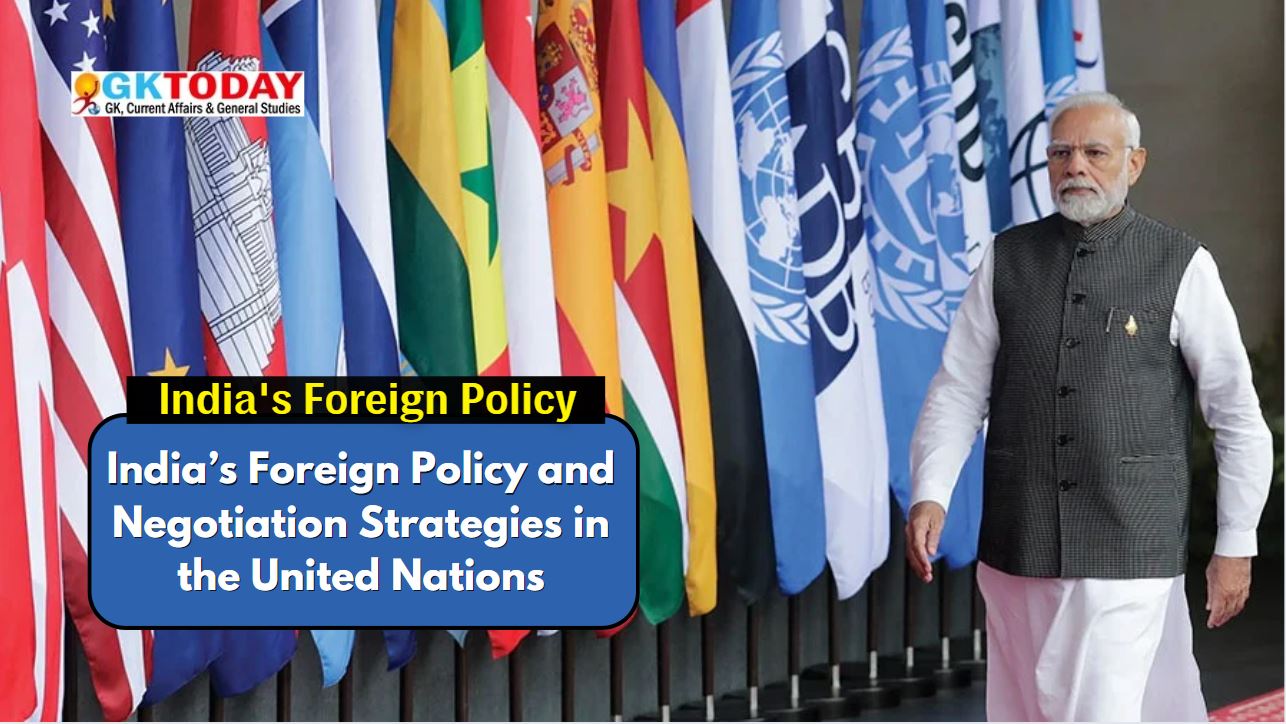India’s Foreign Policy and Negotiation Strategies in the United Nations – UGC-NTA NET Political Science
India’s foreign policy is shaped by its historical context, strategic interests, and its role in international organisations, particularly the United Nations (UN). Since joining the UN in 1945, India has actively engaged in various global issues, advocating for peace, security, and development.
Historical Context
India became a member of the United Nations on October 30, 1945. The country played important role in the founding of the UN and its core principles. India’s experience under colonial rule influenced its stance on global governance. The emphasis on sovereignty and equality stems from its historical struggle for independence and self-determination.
Key Principles of India’s Engagement with the UN
India’s approach to the UN is guided by several key principles:
- Sovereign Equality: India advocates for equal representation and respect for all nations, regardless of size or power.
- Non-Interference: The country emphasises the importance of non-interference in the internal affairs of sovereign states.
- Multilateralism: India supports collective decision-making, believing that global challenges require cooperative solutions.
Major Contributions
India’s contributions to the UN are and diverse:
- Peacekeeping Missions: India is one of the largest contributors to UN peacekeeping forces, deploying over 200,000 troops in various missions since 1948. This commitment reflects India’s dedication to maintaining international peace and security.
- Promotion of Disarmament: India actively participates in discussions surrounding nuclear disarmament and non-proliferation, advocating for a world free of nuclear weapons.
- Sustainable Development Goals (SDGs): India champions global cooperation on sustainable development, aligning its national policies with the SDGs.
Negotiation Strategies
India employs various negotiation strategies to enhance its influence within the UN:
- Coalition Building: India forms alliances with like-minded countries to strengthen its position on critical issues. This strategy is evident in its partnerships with nations in the Global South.
- Soft Power Diplomacy: India utilises cultural diplomacy, showcasing its rich heritage and values, alongside development assistance to enhance its global influence.
- Issue-Based Negotiation: India focuses on specific issues such as climate change, terrorism, and human rights, allowing for targeted and effective negotiations.
Key Areas of Focus
India’s negotiation efforts at the UN centre on several key areas:
- Security Council Reform: India advocates for permanent membership in the UN Security Council, emphasising the need for a more representative body that reflects current global realities.
- Climate Change: India actively participates in climate negotiations, promoting the principle of common but differentiated responsibilities to address the needs of developing nations.
- Global Health: The country engages in discussions on global health issues, particularly in the context of pandemics and equitable access to medicines.
Challenges Faced
India encounters various challenges in its UN engagements:
- Geopolitical Rivalries: Navigating relationships with major powers like the USA, China, and Russia complicates India’s diplomatic efforts.
- Resource Constraints: Limited resources for peacekeeping and development initiatives hinder India’s ability to fulfil its commitments.
- Bureaucratic Hurdles: India’s effectiveness is sometimes hampered by the UN’s complex decision-making processes and implementation challenges.
Recent Developments
India’s recent initiatives at the UN reflect its evolving role:
- COVID-19 Response: India advocated for global cooperation in vaccine distribution and health security, denoting the need for solidarity during the pandemic.
- Digital Governance: The country promotes discussions on digital governance and cybersecurity, recognising the importance of these issues in the modern world.
- Counter-Terrorism: India pushes for a comprehensive convention on international terrorism, addressing a pressing global concern.
India’s Position in UN Bodies
India’s engagement extends across various UN bodies:
- General Assembly: India actively participates in debates and resolutions, contributing to discussions on global issues.
- Economic and Social Council (ECOSOC): The country engages in discussions on economic development and social issues, advocating for equitable growth.
- Human Rights Council: India addresses human rights issues, balancing its national interests with global human rights norms.
Future Directions
Looking ahead, India aims to strengthen its role in global governance:
- Strengthening Global Governance: India advocates for reforms in global governance structures to address contemporary challenges, ensuring a more inclusive decision-making process.
- Enhancing Development Cooperation: The focus will be on South-South cooperation and partnerships for development, encouraging mutual growth among developing nations.
- Promoting Peace and Security: India will continue to emphasise peacekeeping and conflict resolution initiatives, contributing to global stability.
Thus, India’s negotiation strategies within the United Nations reflect its commitment to a multipolar world and equitable global governance. Through coalition building, soft power diplomacy, and issue-based negotiations, India has carved role for itself on the international stage. As it navigates challenges and embraces opportunities, India remains poised to influence global policies and contribute to a more peaceful and prosperous world.




